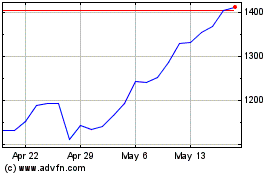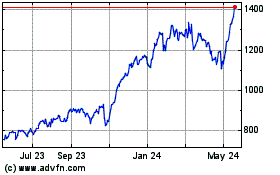New FICO Survey: German Consumers Demand Better Protection Against Online Scams
20 November 2024 - 7:00PM
Business Wire
German consumers expect greater protection from
their banks in the face of increasing real-time payments (RTP) and
growing fraud activity
Highlights
- Additional security checks: Half of consumers want more
protection mechanisms for bank transactions - a clear signal to
banks to strengthen their security processes.
- Willingness to switch banks: Two out of five customers
would switch banks if fraud cases were not resolved transparently,
emphasising the importance of transparency and fast problem
resolution for customer loyalty.
- Concerns about real-time payments: One in four customers
think current security measures for real-time payments are
inadequate, highlighting the need for banks to take action to boost
trust.
A new survey from global analytics software leader FICO shows
that German consumers expect greater protection from their banks in
the face of increasing real-time payments (RTP) and growing fraud
activity. As digitalisation progresses, they are demanding
effective fraud detection, fast communication and targeted alerts
to feel safer from online fraud.
More information:
https://www.fico.com/de/latest-thinking/ebook/2024-scams-impact-survey-germany-german
Real-time payments on the rise - security concerns
remain
Real-time payments are gaining popularity in Germany, but
security concerns remain pronounced. According to the survey, 83
per cent of German consumers have already carried out RTP
transactions, but only 17 per cent plan to use them more frequently
in the next 12 months - a decrease of 8 per cent compared to the
previous year. Only 28 per cent of respondents consider RTP to be
more secure than credit card payments, compared to a global average
of 51 per cent. This shows that while German consumers appreciate
the benefits of RTP, they still have security concerns.
Consumers demand stronger protection from banks
With increasing fraud and the growing threat of fraudulent
transactions, expectations of banks are rising. Almost two-thirds
of respondents (63 per cent) said they had received a text, email,
or phone call they believe was part of a scam in the past year, an
increase of 12 per cent compared to 2023. 27 per cent of
respondents reported that people close to them had also been
affected by fraud. In addition, 13 per cent of respondents reported
financial losses due to payments for products or services that were
never delivered - an increase on the previous year.
In view of these developments, consumers believe that banks have
a duty to take more comprehensive protective measures. For example,
43 per cent of respondents cite improved fraud detection systems to
prevent fraud as the top action a bank should take to protect them
from scams. A further 15 per cent would like to see more frequent
warnings about known or emerging fraud scams, a specific ‘waiting
period’ for large transfers or the active rejection of high-risk
transactions.
Responsibility for losses: consumers expect
compensation
Consumers also expect clear compensation rules from banks for
fraud losses. 65 per cent of respondents believe that banks should
compensate fraud victims - either always (33 per cent) or at least
frequently (32 per cent). At the same time, Germans also perceive
personal responsibility in this regard: 61 per cent state that they
would be responsible for their own security if they were to fall
victim to fraud. Nevertheless, 14 per cent also see the sending
bank as responsible and 13 per cent see the receiving bank as
responsible.
“Our survey results show that German consumers have developed a
strong awareness of fraud risks and expect comprehensive protective
measures from their bank,” says Jens Dauner, vice president and
managing director for DACH & Continental Europe at FICO.
“Banks can only fulfil these expectations if they use modern,
AI-based systems for fraud detection and real-time communication to
secure consumer trust.”
Dissatisfaction with fraud management leads to customer
churn
For banks in Germany, customer satisfaction will be increasingly
crucial in the fight against fraud. Around 75 per cent of
respondents are satisfied with the way their bank handles fraud
cases. However, the survey shows that the willingness to change
banks increases if the service is inadequate: 11 per cent of
consumers would change banks if their concerns were not dealt with
satisfactorily. In addition, 60 per cent would complain to their
bank and 15 per cent would even inform authorities or regulatory
bodies.
Channel preferences for fraud alerts - banks must react
flexibly
The survey results make it clear that consumers expect flexible
communication when it comes to fraud alerts. A growing number (37
per cent) prefer notifications via the banking app, followed by 23
per cent by phone call and 18 per cent by text message.
“Consumer’s communication preferences vary, and banks need to
recognize and respond to this,” said Dauner. “They need to reach
their customers in real time and via their preferred channels in
order to be able to intervene in good time in the event of an
emergency. Only in this way can they not only increase customer
satisfaction, but also prevent customer churn due to inadequate
fraud prevention.”
Methodology
The data referenced here derives from two surveys FICO conducted
in 2023 and 2024. Each survey asked more than 12,000 consumers
across 14 countries, including 1,000 from Germany, their opinions
and experiences regarding RTP usage, scams, and their banks’ scam
management capabilities. When year-over-year comparisons are made,
they are referring to a comparison of these two surveys that asked
the same question in each year the survey was conducted.
About FICO
FICO (NYSE: FICO) powers decisions that help people and
businesses around the world prosper. Founded in 1956, the company
is a pioneer in the use of predictive analytics and data science to
improve operational decisions. FICO holds more than 200 US and
foreign patents on technologies that increase profitability,
customer satisfaction and growth for businesses in financial
services, insurance, telecommunications, health care, retail and
many other industries. Using FICO solutions, businesses in more
than 80 countries do everything from protecting 4 billion payment
cards from fraud, to improving financial inclusion, to increasing
supply chain resiliency. The FICO® Score, used by 90% of top US
lenders, is the standard measure of consumer credit risk in the US
and has been made available in over 40 other countries, improving
risk management, credit access and transparency.
Learn more at http://www.fico.com.
Join the conversation at https://x.com/FICO_corp &
http://www.fico.com/en/blogs/
For FICO news and media resources, visit www.fico.com/news.
FICO is a registered trademark of Fair Isaac Corporation in the
U.S. and other countries.
View source
version on businesswire.com: https://www.businesswire.com/news/home/20241120377983/en/
FICO Pressekontakt Deutschland Maisberger GmbH Christine
Wildgruber / Karl Floros Claudius-Keller-Str. 3c 81669 München
Tel.: +49 89 419 599 - 26 / -27 https://www.maisberger.com E-Mail:
fico@maisberger.com
Fair Isaac (NYSE:FICO)
Historical Stock Chart
From Oct 2024 to Nov 2024

Fair Isaac (NYSE:FICO)
Historical Stock Chart
From Nov 2023 to Nov 2024
